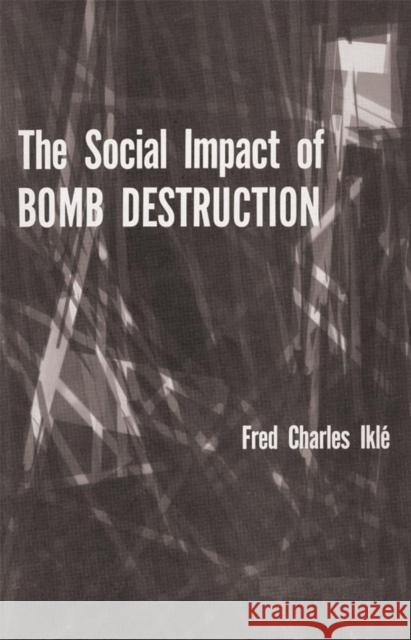The Social Impact of Bomb Destruction » książka
The Social Impact of Bomb Destruction
ISBN-13: 9780806148090 / Angielski / Miękka / 2014 / 284 str.
Since we live in the shadow of nuclear warfare, we must face its probable consequences and be prepared to cope with potentially gruesome and large-scale destruction, says author Fred Charles Ikle. Much has been written about the physical and biological effects of nuclear warfare, but the effect of bombing on the functioning of society-on the lives and activities of city dwellers, on the operation of industries, and even on the organization of a nation-has been largely neglected. This is the first book to deal with the sociological and demographic impact of widespread bomb destruction. The physical effects of nuclear destruction are related to their social consequences, which are ultimately decisive for political and military strategy, as well as civil defense. Ikle's findings are based on an extensive analysis of World War II data from Germany, Japan, Poland, and other countries. He also examined many other types of disasters in order to predict the results of nuclear bombing-from medieval plagues to the evacuation in Holland during the floods of 1953. Statistical comparisons show how different degrees of destruction affect cities or nations. The Social Impact of Bomb Destruction is required reading for all civil defense workers and military personnel, as well as government leaders and civilians who would be informed on the social consequences of bombing-and ways to deal with those consequences. Fred Charles Ikle (1924-2011), a Swiss-born sociologist and defense expert, played a significant role in the establishment of U.S. defense policy. A professor of political science at MIT, Ikle also served as director of the U.S. Arms Control and Disarmament Agency and was appointed Under Secretary of Defense for Policy, from 1981 to 1988."
Since we live in the shadow of nuclear warfare, we must face its probable consequences and be prepared to cope with potentially gruesome and large-scale destruction, says author Fred Charles Iklé. Much has been written about the physical and biological effects of nuclear warfare, but the effect of bombing on the functioning of society-on the lives and activities of city dwellers, on the operation of industries, and even on the organization of a nation-has been largely neglected.This is the first book to deal with the sociological and demographic impact of widespread bomb destruction. The physical effects of nuclear destruction are related to their social consequences, which are ultimately decisive for political and military strategy, as well as civil defense. Iklés findings are based on an extensive analysis of World War II data from Germany, Japan, Poland, and other countries. He also examined many other types of disasters in order to predict the results of nuclear bombing-from medieval plagues to the evacuation in Holland during the floods of 1953. Statistical comparisons show how different degrees of destruction affect cities or nations. The Social Impact of Bomb Destruction is required reading for all civil defense workers and military personnel, as well as government leaders and civilians who would be informed on the social consequences of bombing-and ways to deal with those consequences.Fred Charles Iklé (1924-2011), a Swiss-born sociologist and defense expert, played a significant role in the establishment of U.S. defense policy. A professor of political science at MIT, Iklé also served as director of the U.S. Arms Control and Disarmament Agency and was appointed Under Secretary of Defense for Policy, from 1981 to 1988.











